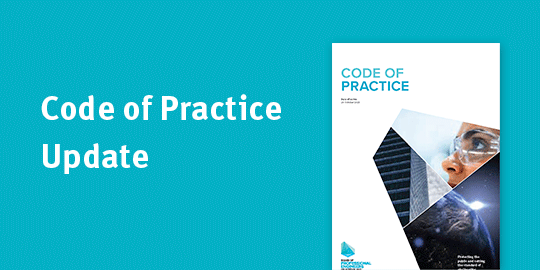
12 Jan Code of Practice update
A key objective of the PE Act is to uphold the standards of practice of RPEQs. The Code of Practice (Code) for RPEQs is a critical measure to help uphold those standards of practice.
The purpose of the Code is to:
- promote the obligations which underpin professional engineering services
- provide a set of guidelines and principles to inform RPEQs on appropriate standards of professional conduct or practice
- affirm the accountability of the engineering profession to the public in Queensland and • promote public confidence in professional engineering services provided by RPEQs undertaking work in or for Queensland.
Put simply, the Code guides RPEQs on how they should conduct themselves in a way that befits their status as professional engineers and is in the best interest of the Queensland public.
The new Code is categorised into three areas – professional conduct, personal conduct and professional expertise.
In a professional sense, the new Code states that RPEQs should maintain professional relationships with colleagues and clients, work within the limits of their professional expertise, treat people with courtesy and dignity, maintain good record keeping and confidentiality practices and maintain health and safety standards in their work.
For personal conduct, the new Code states that RPEQs act as positive role models in their profession and the community, respect the rule of law, act with honesty and integrity, avoid conflicts of interest and act with discretion.
Finally, professional expertise states that RPEQs set and maintain high engineering standards and are aware of the legal requirements that pertain to their profession.
Having a code of practice – a set of ethical standards by which to work – is part of what makes a profession. In turn, that profession may use its ethical code to form a view on whether the conduct of one of its practitioners has fallen below the standards expected.
RPEQs have contacted BPEQ to voice concerns about parts of the new Code and how it will be applied by BPEQ. It should be understood that breaches of the Code of Practice are not criminal offences and BPEQ will only use it to determine if disciplinary proceedings should be brought against a RPEQ. For BPEQ to take disciplinary action against a RPEQ, it ordinarily must first receive a complaint about the RPEQ’s conduct from an aggrieved party. BPEQ is under no compulsion to accept the complaint and can reject complaints. BPEQ has various options should it, following an investigation, decide to discipline a RPEQ. The options range from cautions to cancellation of registration, depending on the severity of the matter.
Key additions to the new Code include that RPEQs:
- By their conduct, endeavour to engender confidence in, and respect for the engineering profession and not act in a way that brings either them or the profession into disrepute.
- Use their best efforts to protect the public such that if a RPEQ believes that a person or other entity has breached any provisions of the PE Act or the Code, the RPEQ should refer the matter to BPEQ.
- Not promise to give or give to any person anything intended to improperly influence that person’s decisions as they relate to their services or to secure work.
- Must ensure their personal or financial interests do not interfere with the performance of their duties.
- Take all reasonable steps to procure and maintain professional indemnity insurance during each year that is appropriate for the services being provided by the RPEQ.
- Be cognisant of their legal, statutory or regulatory responsibilities.
To read the new Code in full visit bpeq.qld.gov.au/resources/code-of-practice.

 MY ACCOUNT
MY ACCOUNT
